South African man admits to role in Singapore's largest seizure of rhino horns after airport scan picks up clues
WhatsApp conversations produced in court documents showed the man discussing the sale and transport of rhino horns with a person in the illegal wildlife trade.
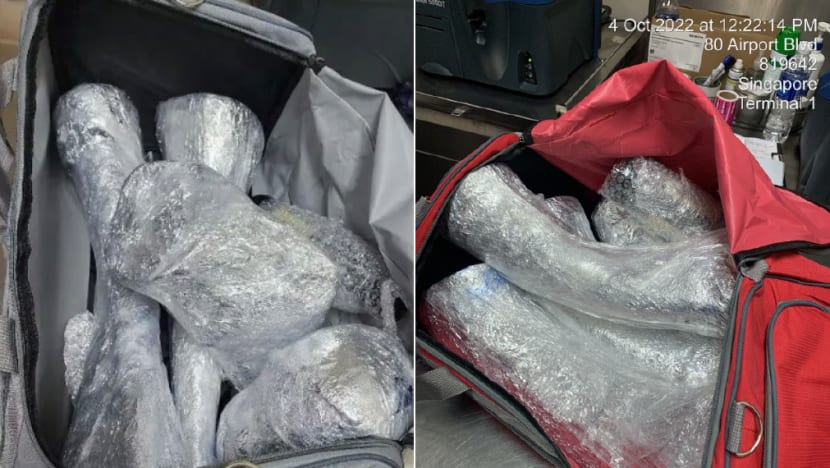
Horns from 20 endangered rhinos, packed in grey and red bags, were seized at Changi Airport in October 2022. It was Singapore's largest seizure of rhino horns. (Photos: Court documents)

This audio is generated by an AI tool.
SINGAPORE: A South African man who tried to transport the horns of endangered rhinoceroses through Singapore's Changi Airport pleaded guilty on Wednesday (Jan 24) in court proceedings that have thrown up details about the illicit trade.
A total of 34.7kg of rhino horns worth around S$1.2 million (US$895,400) were intercepted in October 2022 when the man transited through Singapore on his way to Laos.
It was Singapore's largest seizure of rhino horns.
More than a year after being arrested, Gumede Sthembiso Joel admitted to two counts under the Endangered Species (Import and Export) Act.
CHATS BETWEEN GUMEDE AND "JC HORNS"
The court heard that Gumede, 33, was introduced to a man called Jaycee Israel Marvatona in the illegal rhino trade. He was also known as "JC Horns" among other names.
WhatsApp exchanges between the pair, produced in court documents, showed that Jaycee would send Gumede images and videos of rhino horns, talking about their sale.
In one chat, Jaycee sent Gumede a photo of large horns and asked: "How is your contact on this cargo?"
Gumede responded, asking about the location and weight.
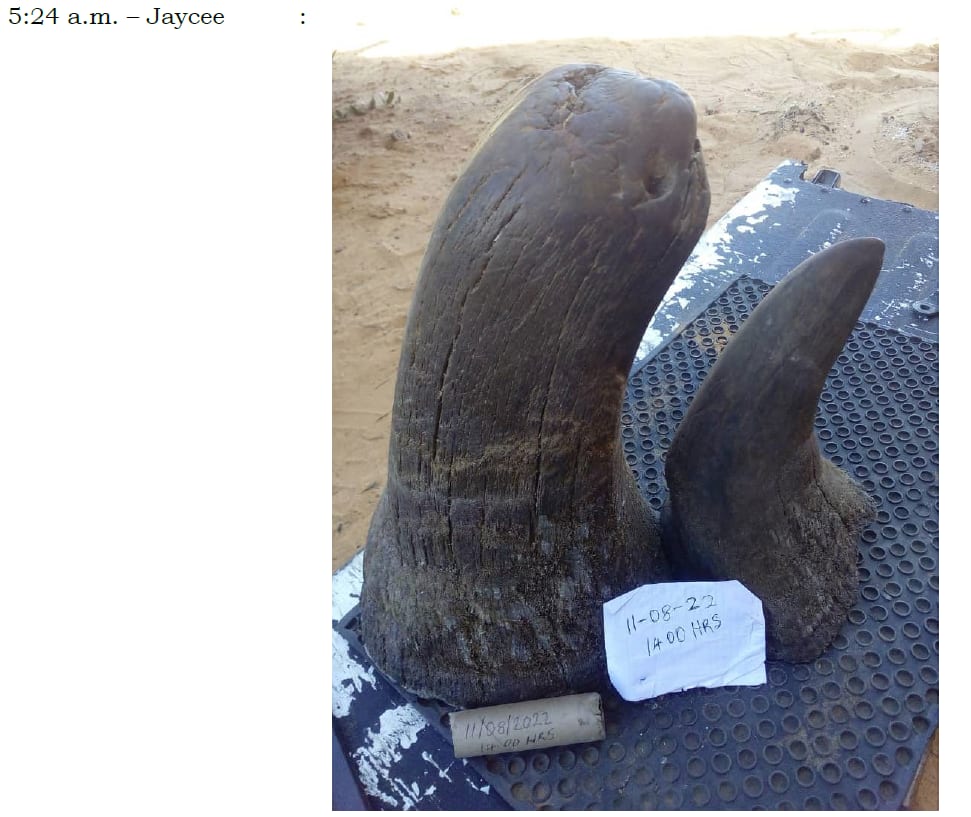
The pair also had discussions about looking for people "to travel" on trips Jaycee arranged.
In one chat, Gumede told Jaycee: "Ok I only have one guy with globe-trotting passport habits so he won't be suspicious if that even counts."
He added in a later message that "this guy wants to know if he can get some of the cash deposit for possible trouble ahead".
The pair also discussed possible options to hide the horns in cargo.
Gumede sent Jaycee a photo of rhino horns as well as bangles, necklaces and beads appearing to be made from the horns, asking what if "we ship ready-mades, declaring jewellery".
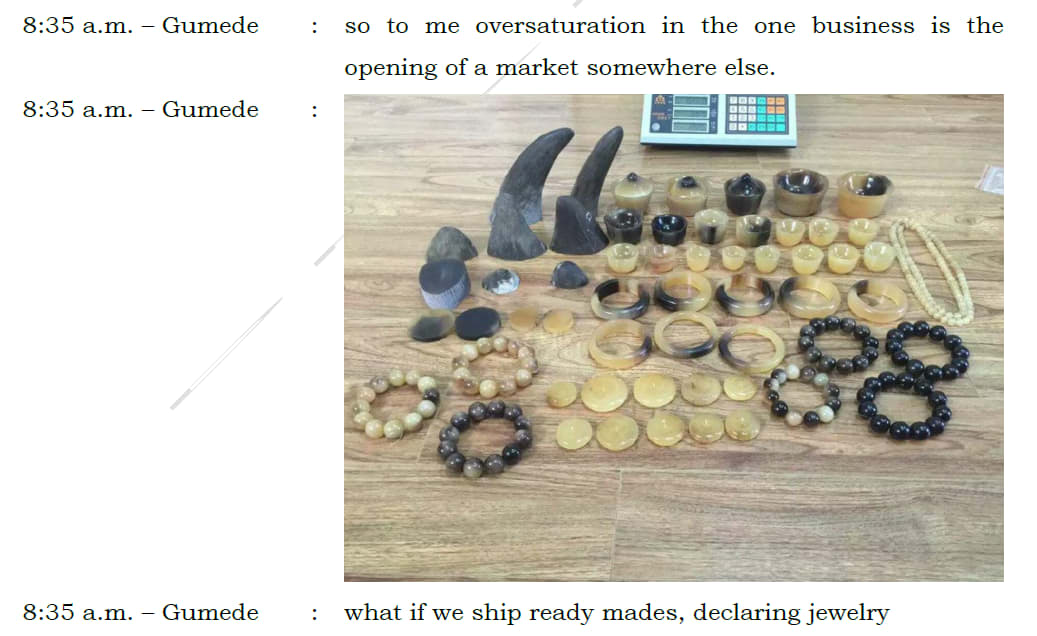
Jaycee responded: "They (know) that move, we did it in 2011."
Gumede answered: "Sure they do, people have been caught even but far less than intact cargo. (They have) limited (resources) to discovering it because they aren't looking for it. Which means, we push more out with less disruption to the chain."
Sometime around September 2022, Jaycee asked Gumede to transport rhino horns from South Africa to Laos through Singapore.
Jaycee said he would make the trip "worthwhile" and provide return tickets and cash. He also asked Gumede to look for someone to go with him in October 2022.
Gumede tried to recruit his acquaintance, South African Chad Berry, telling him that the reward was 30,000 South African Rand (S$2,114) for flying with the package to either Laos or Vietnam.
Gumede and Chad exchanged audio messages on WhatsApp, with Gumede asking if Chad was interested in "maybe just making a little bit of money" in going on one of the trips with him.
In his message, Gumede said he would "probably be using a Dubai route, won't be Singapore".
Chad asked some questions and said the "reward is fine ... just want to weigh that against risk".
In response, Gumede told Chad: "Aside of course from a worst-case scenario which is what you raised where a case is we have to stop at Singapore and there is a storm, and we have to delay a flight. Outside of that, out of 50 times, you literally are not involved, that's what I meant when I said you literally don't engage with this thing ..."
Chad did not end up going with Gumede.
THE FLIGHT
Gumede boarded flight SQ479 and landed in Singapore at about 7am on Oct 4, 2022, intending to take a connecting flight to Vientiane, Laos.
He had checked in two cardboard boxes with baggage tags bearing his name at the OR Tambo International Airport in Johannesburg, South Africa, bound for Changi Airport.
At about 9am on that day, baggage screening officer Norizan Salleh came across the two boxes.
The Certis Cisco officer was in charge of screening X-ray images of transit luggage when she noticed that the boxes, which were wrapped in cling wrap, contained organic items shaped like horns.
She informed her supervisor and the boxes were taken for further inspection, including by the K9 unit of the National Parks Board (NParks).
Meanwhile, a public announcement was made for Gumede to report to the Changi Airport Police Command.
He was escorted to an inspection room, where both boxes were opened. Twenty pieces of rhino horns weighing 34.7kg were found in red and grey bags packed in the two boxes.
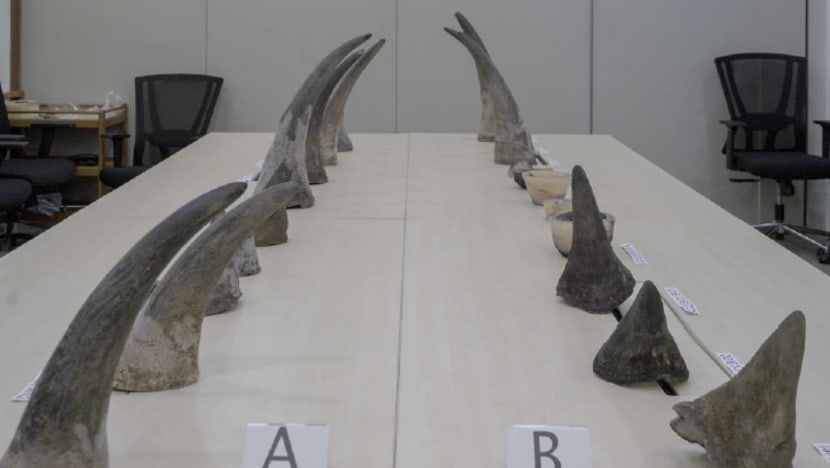
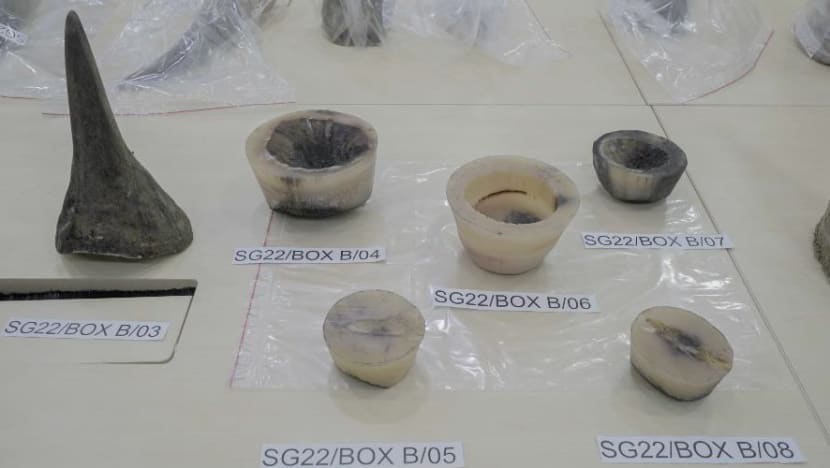
DNA analysis by NParks' experts confirmed that all 20 horns were genuine, from white rhinos and black rhinos.
The two species come under Appendix I of the Convention on International Trade in Endangered Species of Wild Fauna and Flora (CITES), which lists the most endangered species.
International trade in those species is prohibited.
Samples of the horns were sent to the University of Pretoria in South Africa where expert DNA analysis determined that the horns came from 15 southern white rhinos and one black rhino.
Some samples were linked to 11 female rhinos, and the reproduction of such species could have been halted as a result of possible illegal poaching, court documents stated.
Investigations revealed that Jaycee had purchased the horns from illegal poachers in South Africa and arranged to sell them to a person known as "Jimmy" for delivery in Laos.
SINGAPORE'S LARGEST SEIZURE OF RHINO HORNS
Deputy public prosecutors Eric Hu, Ng Shao Yan and Lee Da Zhuan sought three years and one month's jail for Gumede.
They noted that this is the largest seizure of rhino horns in Singapore to date, adding that illegal trade in wildlife species is one of the biggest threats to the survival of many endangered species.
"The more endangered a species, the more coveted it is by traders and collectors," they said. "This leads to more illegal wildlife trading - which in turn results in a vicious cycle that could eventually result in a species' extinction."
The prosecution said that illegal wildlife trade, if left unchecked, will damage Singapore's standing as a financial hub and preferred centre of commerce.
Singapore airports handle more than 30 million passengers annually, with the sheer volume of passenger traffic rendering Singapore vulnerable to exploitation as a conduit for animal smuggling, said the prosecutors.
"There is a need to prevent mislabels of Singapore being a transhipment hub for illegal wildlife," they said.
"For the present case, the detection and seizure of the rhinoceros' horns was only possible due to the vigilance of the officers at the checkpoints."
The prosecution added that Gumede's acts have "contributed to the further decimation of the rhinoceros population".
There are currently fewer than 5,000 black rhinos in the wild, said the prosecutors, with the sharp decline largely due to poaching for rhino horns believed to be a cure-all for many ailments in traditional Chinese medicine.
In Vietnam, the rhinoceros horn is rumoured to cure cancer and is highly sought after by the more affluent community, said the prosecution.
Gumede has been remanded since October 2022.
He was previously acquitted of a third charge of entering into a criminal arrangement regarding the horns after the judge found that an element of the charge had not been made out by the prosecution.
Gumede, who is represented by Ms Stephania Wong from Rajah & Tann, is set to be sentenced on Jan 26.
For bringing in endangered species without the required permits, he could be jailed for up to two years per charge, fined up to S$50,000 per species, or both.














